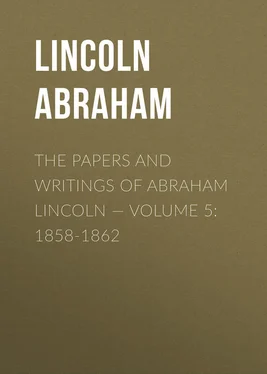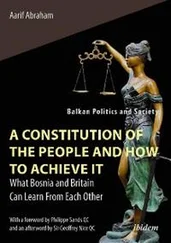Abraham Lincoln - The Papers And Writings Of Abraham Lincoln — Volume 5 - 1858-1862
Здесь есть возможность читать онлайн «Abraham Lincoln - The Papers And Writings Of Abraham Lincoln — Volume 5 - 1858-1862» — ознакомительный отрывок электронной книги совершенно бесплатно, а после прочтения отрывка купить полную версию. В некоторых случаях можно слушать аудио, скачать через торрент в формате fb2 и присутствует краткое содержание. Жанр: foreign_antique, foreign_prose, на английском языке. Описание произведения, (предисловие) а так же отзывы посетителей доступны на портале библиотеки ЛибКат.
- Название:The Papers And Writings Of Abraham Lincoln — Volume 5: 1858-1862
- Автор:
- Жанр:
- Год:неизвестен
- ISBN:нет данных
- Рейтинг книги:4 / 5. Голосов: 1
-
Избранное:Добавить в избранное
- Отзывы:
-
Ваша оценка:
- 80
- 1
- 2
- 3
- 4
- 5
The Papers And Writings Of Abraham Lincoln — Volume 5: 1858-1862: краткое содержание, описание и аннотация
Предлагаем к чтению аннотацию, описание, краткое содержание или предисловие (зависит от того, что написал сам автор книги «The Papers And Writings Of Abraham Lincoln — Volume 5: 1858-1862»). Если вы не нашли необходимую информацию о книге — напишите в комментариях, мы постараемся отыскать её.
The Papers And Writings Of Abraham Lincoln — Volume 5: 1858-1862 — читать онлайн ознакомительный отрывок
Ниже представлен текст книги, разбитый по страницам. Система сохранения места последней прочитанной страницы, позволяет с удобством читать онлайн бесплатно книгу «The Papers And Writings Of Abraham Lincoln — Volume 5: 1858-1862», без необходимости каждый раз заново искать на чём Вы остановились. Поставьте закладку, и сможете в любой момент перейти на страницу, на которой закончили чтение.
Интервал:
Закладка:
Your obedient servant,
A. LINCOLN.
TO T. CANISIUS
DR. THEODORE CANISIUS.
DEAR SIR: — Your note asking, in behalf of yourself and other German citizens, whether I am for or against the constitutional provision in regard to naturalized citizens, lately adopted by Massachusetts, and whether I am for or against a fusion of the Republicans and other opposition elements for the canvass of 1860, is received.
Massachusetts is a sovereign and independent State; and it is no privilege of mine to scold her for what she does. Still, if from what she has done an inference is sought to be drawn as to what I would do, I may without impropriety speak out. I say, then, that, as I understand the Massachusetts provision, I am against its adoption in Illinois, or in any other place where I have a right to oppose it. Understanding the spirit of our institutions to aim at the elevation of men, I am opposed to whatever tends to degrade them. I have some little notoriety for commiserating the oppressed negro; and I should be strangely inconsistent if I could favor any project for curtailing the existing rights of white men, even though born in different lands, and speaking different languages from myself. As to the matter of fusion, I am for it if it can be had on Republican grounds; and I am not for it on any other terms. A fusion on any other terms would be as foolish as unprincipled. It would lose the whole North, while the common enemy would still carry the whole South. The question of men is a different one. There are good, patriotic men and able statesmen in the South whom I would cheerfully support, if they would now place themselves on Republican ground, but I am against letting down the Republican standard a hairsbreadth.
I have written this hastily, but I believe it answers your questions substantially.
Yours truly,
A. LINCOLN.
TO THE GOVERNOR, AUDITOR, AND TREASURER OF THE STATE OF ILLINOIS
In reply to your inquiry; requesting our written opinion as to what your duty requires you to do in executing the latter clause of the Seventh Section of "An Act in relation to the payment of the principal and interest of the State debt," approved Feb'y 22, 1859, we reply that said last clause of said section is certainly indefinite, general, and ambiguous in its description of the bonds to be issued by you; giving no time at which the bonds are to be made payable, no place at which either principal or interest are to be paid, and no rate of interest which the bonds are to bear; nor any other description except that they are to be coupon bonds, which in commercial usage means interest-paying bonds with obligations or orders attached to them for the payment of annual or semiannual interest; there is we suppose no difficulty in ascertaining, if this act stood alone, what ought to be the construction of the terms "coupon bonds" and that it, would mean bonds bearing interest from the time of issuing the same. And under this act considered by itself the creditors would have a right to require such bonds. But your inquiry in regard to a class of bonds on which no interest is to be paid or shall begin to run until January 1, 1860, is whether the Act of February 18, 1857, would not authorize you to refuse to give bonds with any coupons attached payable before the first day of July, 1860. We have very maturely considered this question and have arrived at the conclusion that you have a right to use such measures as will secure the State against the loss of six months' interest on these bonds by the indefiniteness of the Act of 1859. While it cannot be denied that the letter of the laws favor the construction claimed by some of the creditors that interest-bearing bonds were required to be issued to them, inasmuch as the restriction that no interest is to run on said bonds until 1st January, 1860, relates solely to the bonds issued under the Act of 1857. And the Act of 1859 directing you to issue new bonds does not contain this restriction, but directs you to issue coupon bonds. Nevertheless the very indefiniteness and generality of the Act of 1859, giving no rate of interest, no time due, no place of payment, no postponement of the time when interest commences, necessarily implies that the Legislature intended to invest you with a discretion to impose such terms and restrictions as would protect the interest of the State; and we think you have a right and that it is your duty to see that the State Bonds are so issued that the State shall not lose six months' interest. Two plans present themselves either of which will secure the State. 1st. If in literal compliance with the law you issue bonds bearing interest from 1st July, 1859, you may deduct from the bonds presented three thousand from every $100,000 of bonds and issue $97,000 of coupon bonds; by this plan $3000 out of $100,000 of principal would be extinguished in consideration of paying $2910 interest on the first of January, 1860 — and the interest on the $3000 would forever cease; this would be no doubt most advantageous to the State. But if the Auditor will not consent to this, then, 2nd. Cut off of each bond all the coupons payable before 1st July, 1860.
One of these plans would undoubtedly have been prescribed by the Legislature if its attention had been directed to this question.
May 28, 1859.
ON LINCOLN'S SCRAP BOOK
SPRINGFIELD, December 25, 1858.
H. C. WHITNEY, ESQ.
MY DEAR SIR: — I have just received yours of the 23rd inquiring whether I received the newspapers you sent me by express. I did receive them, and am very much obliged. There is some probability that my scrap-book will be reprinted, and if it shall, I will save you a copy.
Your friend as ever,
A. LINCOLN.
1859
FIRST SUGGESTION OF A PRESIDENTIAL OFFER.
TO S. GALLOWAY
HON. SAMUEL GALLOWAY.
MY DEAR SIR: — Your very complimentary, not to say flattering, letter of the 23d inst. is received. Dr. Reynolds had induced me to expect you here; and I was disappointed not a little by your failure to come. And yet I fear you have formed an estimate of me which can scarcely be sustained on a personal acquaintance.
Two things done by the Ohio Republican convention — the repudiation of Judge Swan, and the "plank" for a repeal of the Fugitive Slave Law — I very much regretted. These two things are of a piece; and they are viewed by many good men, sincerely opposed to slavery, as a struggle against, and in disregard of, the Constitution itself. And it is the very thing that will greatly endanger our cause, if it be not kept out of our national convention. There is another thing our friends are doing which gives me some uneasiness. It is their leaning toward "popular sovereignty." There are three substantial objections to this: First, no party can command respect which sustains this year what it opposed last. Secondly, Douglas (who is the most dangerous enemy of liberty, because the most insidious one) would have little support in the North, and by consequence, no capital to trade on in the South, if it were not for his friends thus magnifying him and his humbug. But lastly, and chiefly, Douglas's popular sovereignty, accepted by the public mind as a just principle, nationalizes slavery, and revives the African slave trade inevitably.
Taking slaves into new Territories, and buying slaves in Africa, are identical things, identical rights or identical wrongs, and the argument which establishes one will establish the other. Try a thousand years for a sound reason why Congress shall not hinder the people of Kansas from having slaves, and, when you have found it, it will be an equally good one why Congress should not hinder the people of Georgia from importing slaves from Africa.
Читать дальшеИнтервал:
Закладка:
Похожие книги на «The Papers And Writings Of Abraham Lincoln — Volume 5: 1858-1862»
Представляем Вашему вниманию похожие книги на «The Papers And Writings Of Abraham Lincoln — Volume 5: 1858-1862» списком для выбора. Мы отобрали схожую по названию и смыслу литературу в надежде предоставить читателям больше вариантов отыскать новые, интересные, ещё непрочитанные произведения.
Обсуждение, отзывы о книге «The Papers And Writings Of Abraham Lincoln — Volume 5: 1858-1862» и просто собственные мнения читателей. Оставьте ваши комментарии, напишите, что Вы думаете о произведении, его смысле или главных героях. Укажите что конкретно понравилось, а что нет, и почему Вы так считаете.












